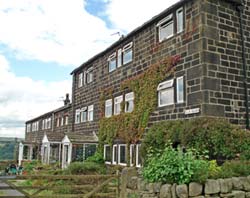Clubhouses: self help and co-operation
Tuesday, 30 October 2012
 A small row of houses in Old Town, called Clubhouses, encapsulates some of the history and spirit of the Calder Valley.
A small row of houses in Old Town, called Clubhouses, encapsulates some of the history and spirit of the Calder Valley.
Julie Cockburn told a meeting of the Hebden Bridge Local History Society how she had always been attracted by the sunny spot and the extensive views and leapt at the chance to purchase one. This led to Julie and her neighbours carrying out some fascinating research, using deeds, chapel records and censuses, to uncover the history of Clubhouses. The terrace in Old Town is one of several in the valley to go by the name Clubhouses, built in the early 19th century by self-help groups or clubs whose original purpose was to defray the cost of burial. Some of these burial societies were very successful, and building houses was a way to invest their capital.
The Lane Ends Burial Society responsible for building Old Town Clubhouses met at the Hare and Hounds and built the cottages in 1823. They were originally designed as weavers’ cottages, at a time when hand loom weaving was still a profitable trade, with a shared weaving room across the top floor, and connecting doors between the houses to enable workers to get access to the shared room. The census returns showed that most of the residents were engaged in worsted weaving until the trade began to fail later in the century. Many of the small cottages housed families of six or seven adults: impossible to imagine now.
The ‘poverty knocking’ of the looms in the shared weaving room was replaced by other sounds as the century progressed and factories replaced the domestic system. Instead came the sounds of reading aloud from newspapers, bible and political texts, as the Club Room was used as a reading room, library and a day school for the half timers who worked in the nearby Acre Mill. Adults and children continued their education in the lime-washed room with its rows of benches, stove and simple pulpit.
Despite modernisation, the stones of the old cottages can still tell the story of a group of local people who worked together to improve their lives.
The Hebden Bridge Local History Society holds a series of fortnightly Wednesday talks at the Methodist Hall in Hebden Bridge, beginning at 7. 30 pm. On November 14th Mike Edwards will be examining the story and significance of local war memorials erected as communities tried to come to terms with the aftermath of World War One.
See also
Small Town Saturday Night - The story of a love affair with rock 'n roll at its peak in the 1950s and 60s from speaker Trevor Simpson.
The world of Cornelius Ashworth, speaker Alan Petford, Local History talk of 10 October 2012

